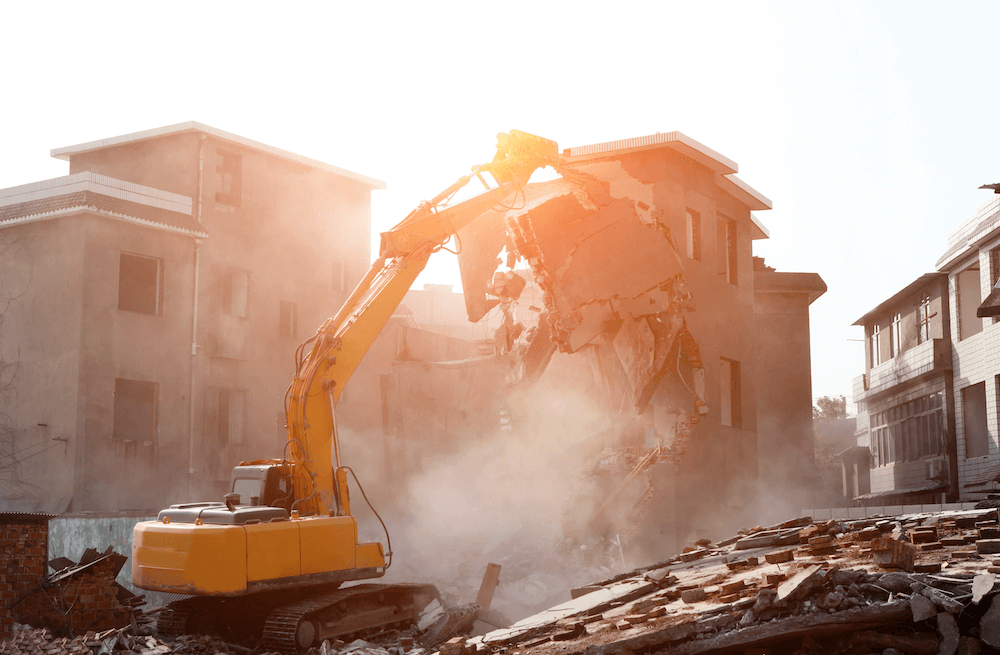
Residential Demolition and Custom Home Building
Are you thinking about demolishing your current house and starting over with a bespoke dream home? You’ve found it! We will explore the realm of custom house construction and residential demolition in this post, giving you all the knowledge you need to start this thrilling adventure. We can help you with everything from comprehending the essential elements of residential demolition to discovering the several options for building the ideal bespoke house.
With years of combined industry knowledge, our team of professionals guarantees accurate and current insights. The process of residential demolition and custom house construction may be complicated, regardless of whether you’re a developer hoping to maximize your investment or a homeowner wanting to update your present home. But if you have the correct information and direction, you may walk this road with assurance and accuracy.
OUR SERVICES
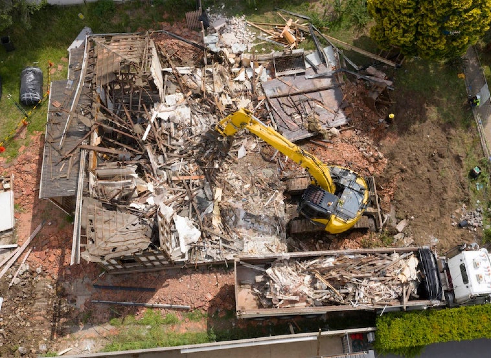
Structure Demolition. Residential, Commercial & Industrial
If your structure poses a health, safety, or environmental risk, demolition can prevent costly citations or fatal accidents. While this may seem daunting, you are just a phone call away from having your residential demolition done professionally, responsibly, and at a great price.
Talk to a Demolition Specialist Now! 916.249.5001
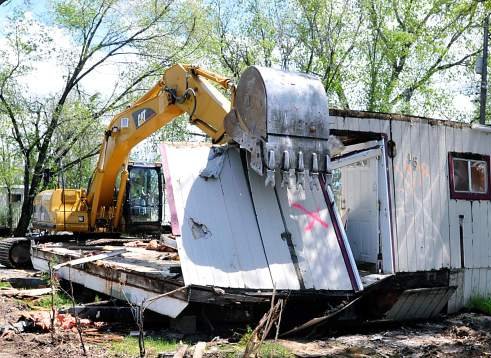
Mobile Home Demolition
We demolish and haul away mobile homes. Any size, anywhere, anyhow. We are fast, clean and competitive. We serve most of Northern California. There are many factors to consider when removing or demolishing your old trailer, mobile home, or manufactured home like: the processes involved, costs, time, contractors, debris, and permits.
Talk to a Demolition Specialist Now! 916.249.5001
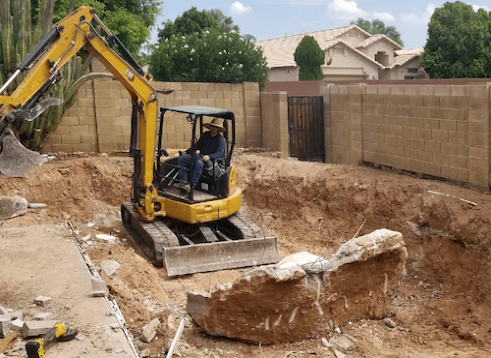
Pool Demolition
When removing a pool in Sacramento, California with the professional demolition team of Maxton Demo, you’re guaranteed peace of mind from beginning to end. From your initial request for an estimate to clean-up, you can expect our pool demolition process that’s completely professional and safe.
Talk to a Demolition Specialist Now! 916.249.5001
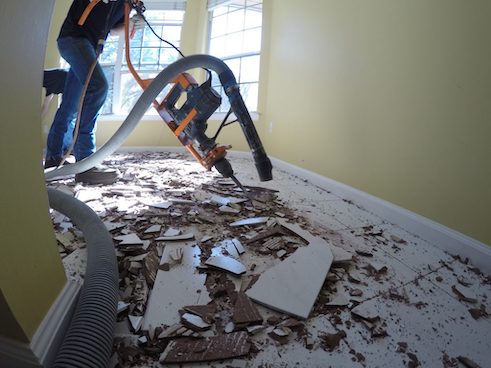
Floor Demolition
Flooring demolition, like any other major home renovation work, requires a specific set of skills and tools to be performed properly. You need experts in flooring demolition to get you the best floors possible. Contact us to find out more about how we can help you today.
Talk to a Demolition Specialist Now! 916.249.5001
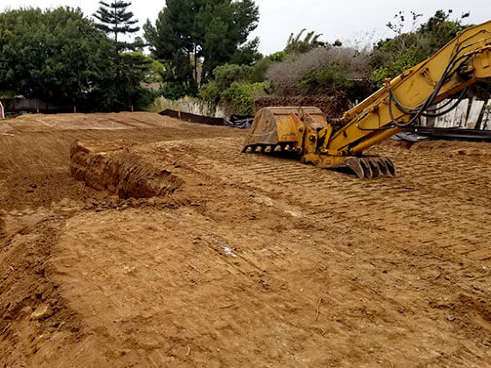
Grading & Excavating
If you need an experienced excavator and grader in Sacramento, call us today. One of the many reasons that residential, commercial, and industrial customers choose to work with us is because we’re able to provide a broad range of services to help construction-related projects get done in less time and at a reduced cost.
Talk to a Demolition Specialist Now! 916.249.5001

Roof Snow Removal
Heavy snow & ice dams can cause significant roof and home damage. Roof Snow removal is our specialty during the winter months. Serving the Sacramento, California area for 10 years, we can get your roof snow removed and promise a quick response and reasonable rates.
Talk to a Demolition Specialist Now! 916.249.5001
Understanding the Importance of Residential Demolition
An essential phase in creating a bespoke house is residential demolition. It entails demolishing a current building entirely or in part to create room for a new one to be built. Residential demolition is necessary for a number of reasons, despite the fact that it may seem like a difficult undertaking.
First of all, it gives you a new start to destroy an old house. It offers you the chance to plan and construct a house that precisely matches your requirements and tastes. Residential demolition offers a blank canvas for your ideal house, whether you want to change the layout, add more room, or install energy-efficient technologies.
Second, any possible safety risks may be removed by tearing down an outdated building. Older houses may have unsafe structural flaws, shoddy electrical systems, or shaky foundations that endanger the residents. Rebuilding your unique house from the ground up will guarantee that it satisfies all current safety regulations.
Last but not least, residential demolition might raise your property’s worth. You may possibly demand a better selling price and draw in more prospective purchasers if you replace your outdated, old house with a brand-new, bespoke one. Because they differ from other conventional houses on the market with their distinctive features and individualized design components, custom homes are in great demand.
In conclusion, residential demolition is a crucial phase in the construction of a bespoke house. It enables you to design a house that perfectly satisfies your needs, removes any dangers, and raises the value of your land.
The Process of Residential Demolition
There are many procedures involved in residential demolition that need to be properly planned and carried out. Adhering to the correct protocols is essential for guaranteeing a seamless and effective demolition operation. An outline of the common procedures involved in home demolition is provided below:
Getting the relevant permissions: You must get the proper permits from your municipality or local government before beginning any demolition activity. These licenses guarantee that the demolition procedure conforms with building rules, safety requirements, and zoning laws.
Disconnecting utilities: All services, including gas, electricity, and water, must be correctly disconnected prior to the demolition of a residential building. By taking this action, you may protect surrounding properties and safeguard the safety of your personnel.
Structural assessment: To find any possible dangers or structural problems that can influence the demolition process, a qualified structural engineer should assess the building. An effective and safe demolition strategy is developed with the aid of this examination.
Removal of asbestos and other hazardous materials: To remove and properly dispose of asbestos and other hazardous materials from a building, qualified experts must be consulted. In order to safeguard employee health and avoid contaminating the environment, asbestos removal is essential.
Selection of demolition techniques: There are a variety of techniques for demolishing a building, depending on its size, location, and state. Common techniques include controlled implosion for huge buildings, mechanical destruction with heavy machines, and manual demolition.
Execution of the demolition: After all necessary preparations are finished, the real demolition work may start. Experts in demolition meticulously disassemble the building or use the selected technique to conduct controlled destruction. Throughout the procedure, safety precautions, including debris removal and dust control measures, are put into place.
Waste disposal and site cleanup: Following demolition, the area must be made free of trash and debris. It is necessary to dispose of garbage properly, which includes recycling things wherever feasible.
Final permissions and inspections: To guarantee that the demolition process was completed properly and that the site is safe for future building, local authorities will carry out final inspections. After being accepted, you may proceed to the next stages of the construction process for a bespoke house.
Professional competence, strict respect for rules, and meticulous planning are necessary for the process of demolishing residential buildings. You can guarantee a successful demolition and get the land ready for the building of your unique dream house by following these procedures.
Areas We Service
Demolition Contractor Sacramento
Demolition Contractor Nevada City
Demolition Contractor Grass Valley
Demolition Contractor Gold Run
Demolition Contractor Emigrant Gap
Demolition Contractor Soda Springs
Demolition Contractor Tahoe City
Demolition Contractor Twin Bridges
Demolition Contractor Placerville
Demolition Contractor in Roseville
Demolition Contractor in Auburn
Demolition Contractor in Davis
Demolition Contractor in Dixon
Demolition Contractor in Esparto
Demolition Contractor in Folsom
Demolition Contractor in Lincoln
Demolition Contractor in Plymouth
Demolition Contractor in Rocklin
Demolition Contractor in Shingle Springs
Demolition Contractor in Vacaville
Demolition Contractor in Fairfield
Demolition Contractor in Yountville
Demolition Contractor in Antioch
Demolition Contractor in Concord
Demolition Contractor in Walnut Creek
Demolition Contractor in Lafayette
Demolition Contractor in San Ramon
Factors to Consider Before Starting a Residential Demolition Project
Prior to starting a home demolition job, there are a few things to think about. These elements may support you in making wise choices and guarantee a seamless demolition procedure. Let’s look at a few crucial factors:
Budget and expenses: The cost of demolition may vary based on the size of the building, the technique of destruction that is selected, and any other needs, such as asbestos clearance. It is essential to plan for these expenses and make sure you have enough money to pay for the complete demolition procedure.
influence on the environment: Demolition may have an influence on the environment, particularly if there are any dangerous chemicals present. Working with experts who put an emphasis on eco-friendly procedures and disposal techniques is crucial. Reducing the environmental effect of demolition may also be achieved by recycling materials wherever they are available.
Adjacent properties: It is crucial to take into account the effects on nearby properties while organizing a home demolition. Vibrations, noise, and dust produced during the demolition process may have an impact on surrounding homes and cause disturbances to the lives of occupants. Any difficulties may be reduced by being in contact with your neighbors and adopting the appropriate safety measures.
Timeline and scheduling: Depending on the technique used and the complexity of the building, demolition projects may take a variety of lengths of time. Setting up a reasonable timeframe and planning the demolition procedure in accordance with it are crucial. This guarantees that there won’t be any needless delays in the process of developing your unique house.
Safety precautions: Since demolition is a risky activity, safety procedures must be strictly followed. It is essential to hire qualified experts who put safety first in order to safeguard both the environment and the workforce. Verify that the demolition crew has the insurance and qualifications required to do the job safely.
You may successfully begin your custom house construction adventure, reduce possible dangers, and prepare for a residential demolition job by keeping these things in mind.
Benefits of Custom Home Building
Custom house construction has several advantages that make it a desirable option for both home builders and real estate investors. Let’s examine a few of the main benefits of creating a bespoke home:
Personalization: Being able to customize every element of your house is one of the biggest benefits of creating a custom home. You have total control over designing a room that expresses your own style and preferences, from the layout and design to the materials used and the tiniest details.
Functionality: Custom houses are made to fit your unique requirements and way of life. You may add specialty rooms or features, integrate smart home technologies, and optimize the layout to improve operation. This degree of personalization guarantees the smooth and effective operation of your house.
Quality and craftsmanship: You have the chance to collaborate with skilled builders and craftspeople who place a high value on quality when you create a bespoke house. Superior materials and building methods are used to construct custom houses to higher standards. This guarantees that your house is long-lasting and strong, in addition to having a beautiful appearance.
Energy efficiency: modern insulation, solar power, energy-efficient appliances, and smart home automation are just a few examples of the energy-efficient elements that may be included in custom houses. These characteristics support a more sustainable lifestyle by using less energy, resulting in cheaper power costs.
Long-term investment: Investing in the construction of a bespoke house may provide significant profits. Particularly when constructed in sought-after areas, custom houses can increase in value over time. Furthermore, if you ever decide to sell, prospective purchasers will find custom houses to be quite appealing due to their superior craftsmanship and customization.
Feeling of achievement: Realizing your dream by creating a bespoke house is a noteworthy accomplishment. Having created a home that is entirely your own gives you a feeling of pride and achievement. Living in a house that fulfills all of your wants might bring you immense happiness.
Building a custom house has many advantages that make it a desirable choice for anyone looking for an excellent and highly customized living environment. You can build a house that surpasses your aspirations and endures the test of time with meticulous planning and the appropriate staff.
Planning and designing your custom home
The exciting stage of the process, when you may realize your idea, is planning and creating your bespoke house. To make sure that your custom house satisfies all of your needs, it is imperative that you approach this step with extreme attention to detail. The following are important actions to think about while organizing and creating your bespoke home:
Determine your needs. To begin, jot out a list of your top priorities and necessities. Think about things like how many bathrooms and bedrooms you need, your preferred layout, and any particular features or functionality you need. This list will function as a roadmap for the whole planning and design procedure.
Employ an architect. To translate your concept into a workable and visually beautiful design, you must collaborate with an expert architect. Work closely with the architect, sharing your needs and preferences with them. The architect will draft a preliminary design that complies with construction laws and requirements and integrates your ideas.
Take the site into consideration: Assess the features of your construction site and how they may impact the layout of your custom house. The terrain, vistas, sun exposure, and nearby buildings are a few examples of the factors that might affect your home’s layout and orientation. Making the most of the location will guarantee that your house complements the surroundings.
Choose your style: Think about the architectural design that most aligns with your preferences and the overall look you want to accomplish. Regardless of your preference for a contemporary, farmhouse, Mediterranean, or traditional style, an architect may assist you in incorporating the design aspects that characterize your style.
Customize the floor plan in close consultation with your architect to ensure that it suits your demands. Take into account elements like the size of the rooms, the flow between them, and how each section functions. With this personalization, you can be confident that you and your family will have the best possible living space in your dream house.
Material selection: Pick materials that complement your desired degree of sustainability, budget, and aesthetic preferences. Every material selection you make, from cabinets and exterior treatments to flooring and countertops, influences the overall appearance and feel of your new home.
Future demands should be taken into account. Plan ahead and include design features that will enable flexibility and adaptation. Take into account elements like aging in place, future growth, or adding multipurpose spaces. This innovative method guarantees that your bespoke house will continue to be useful and fashionable for many years to come.
Your custom home may be thoughtfully planned and designed to suit your requirements, precisely represent your taste, and provide you and your family with a pleasant place to live. Working together with knowledgeable experts at every stage of the process guarantees that your idea will be realized as a well-designed project.
Choosing the Right Builder for Your Custom Home Project
The success of your custom home project depends on your choice of builder. Your choice of builder will have a big influence on the final product, schedule, and overall enjoyment of creating your dream house. When choosing a builder, take into account the following important factors:
Reputation and experience: Seek out builders that have a track record of success building bespoke homes. Examine their portfolio to determine the quality of their output and their track record of keeping their word. To determine their reputation and degree of client happiness, go through the endorsements and reviews left by prior customers.
Specialization: Select a builder with experience building unique homes. When it comes to building, custom houses need a different set of abilities and knowledge than conventional ones. Builders with custom house expertise are more likely to comprehend your idea and carry it out precisely.
Transparency and communication: Working with a builder to create a personalized house requires constant contact. Seek out a builder who will communicate with you in an open and transparent manner, keeping you updated at every stage. Your expectations will be fulfilled, and any issues or modifications will be taken care of right away if there is clear and timely communication.
Recommendations and references: Request references from prior customers from the builder. To learn more about these references’ personal experiences dealing with the builder, get in touch with them. Ask friends, relatives, or experts in the field who have worked with custom house builders before for suggestions.
Budget and price: Be forthright with prospective builders about your expectations about your budget and pricing. Reputable builders will provide you with a thorough explanation of costs and be open and honest about their prices. When a builder bids you far less than others, be cautious since this might mean subpar work or additional fees later on.
Insurance and licenses: Verify that the builder has the required permits and certificates to do business in your region. Make sure they also have sufficient insurance to safeguard your investment and you throughout the building process.
Trust and compatibility: Building a custom house is a team effort that calls for strong communication between you and the builder. Follow your gut and choose a builder who inspires confidence and comfort in you. A constructor is more likely to succeed if they pay attention to your ideas, comprehend your vision, and show respect for your preferences.
By taking these things into account and doing extensive research, you may choose a builder that fits your requirements, goals, and price range. Your dream house will become a reality with the help of a dependable and knowledgeable builder who will walk you through the custom home construction process.
The Construction Process of a Custom Home
When the phases of design and planning are over, it’s time to start building your unique house. There are many points in the building process that you, the builder, and different subcontractors must closely coordinate with one another. An outline of the normal building procedure for a bespoke house is provided below:
Site preparation: The building site must be ready before construction can start. This includes leveling the land, defining the borders, and clearing the area. During this phase, any essential excavation work is also completed, such as installing utilities or digging foundations.
Building a foundation: Your custom home’s foundation serves as its support system and source of stability. Usually composed of concrete, it is built in accordance with the designed blueprints.
Home Demolition and Property Appraisal
In the current competitive real estate market, homeowners are often looking for methods to raise the value of their houses. One tactic that has gained traction lately is the destruction of residential buildings. Homeowners want to ensure a greater property value and draw in more bids by demolishing an old or damaged house and erecting a more attractive, contemporary one. But does residential destruction live up to expectations?
The Impact of Residential Demolition on Property Value
There are a number of variables to consider when considering residential demolition, which may have a substantial influence on property value. The quality of the new building, the location of the property, and the state of the current structure are all important factors that might influence whether or not a demolition project will result in a higher valuation.
An important factor in evaluating a property’s value is its location. Demolition of an existing house and construction of a new one might be a wise decision in attractive districts where land is in short supply. Buyers are often prepared to spend more on a brand new house in these locations. However, in less attractive areas where there is an abundance of housing choices, a residential demolition project could provide a poorer return on investment.
Another important consideration is the state of the current structure. Tearing down the existing house and starting over might be a smart move if it has obsolete features, structural problems, or is in bad shape. This enables the homeowner to design a more appealing and useful area, thus increasing the value of their house. Nonetheless, this can be a more economical choice if the current building can be saved, restored, or rebuilt at a lower cost.
Finally, the new construction’s quality is crucial. Buyers are searching for properties with top-notch finishing, energy efficiency, and contemporary amenities. The new development has the potential to greatly raise the value of the land if it lives up to these expectations. But the new house could not provide the anticipated return on investment if it is badly planned or devoid of appealing features.
Factors to Consider Before Engaging in Residential Demolition
Prior to starting a house demolition project, homeowners need to give a number of things considerable thought. They must, above all, evaluate the project’s financial viability. Permits, demolition fees, garbage collection, and construction charges are just a few of the expenditures associated with residential demolition projects. It is critical to comprehend the budget and make sure that the expenditures are justified by the possible return on investment.
Homeowners should also assess the state of the local market at the moment. It may not be the best moment to start a residential demolition project if the real estate market is declining or if there is an excess of available homes. However, if the market is doing well and there is a significant demand for new houses, now can be the right time to demolish and rebuild.
Homeowners should also take into account the possible disturbance and difficulty that a demolition project may bring about. Construction and demolition sites may be untidy, loud, and inconvenient for the neighbors. To minimize the effect on the neighborhood, it is essential to maintain communication with neighbors and make sure that all applicable licenses and laws are followed.
Case Studies: Examples of Residential Demolitions and Their Effect on Property Value
Let’s look at a few case studies to get a better idea of how residential demolition affects property value. These examples will provide various situations and results, highlighting the possible advantages and disadvantages of demolishing and reconstructing a house.
Case Study 1: The Smiths made the decision to build a contemporary two-story house in its place instead of their dilapidated bungalow in a desirable area. High-end finishing, energy-efficient technologies, and an open floor concept were all included in the new structure. As a consequence, the Smiths got many bids above their asking price, and the house value climbed by thirty percent when compared to comparable properties in the region.
Case Study 2: The Johnsons owned a home in an area where property prices were falling. In an attempt to draw in purchasers with a modern and fresh design, they destroyed their old house and constructed a new one. But since there was so much housing in the region, the value of the house didn’t really rise, so they had to reduce their asking price in order to get a deal.
These case studies emphasize how crucial it is to take into account the particulars of the property and its location before choosing to proceed with a residential demolition project. It may not always provide a sizable return on investment, even if it sometimes results in big improvements in property value.
The Role of Local Regulations and Permits in Residential Demolition
Before starting a residential demolition project, homeowners have to go through a complex web of municipal laws and permissions. Regulations pertaining to zoning, building, and destruction are specific to each jurisdiction. There may be penalties, delays, or even legal repercussions for breaking these rules.
It is essential to speak with the neighborhood building department or work with a licensed contractor who is aware of the regulations in the area. They may help homeowners navigate the permitting procedure, making sure that the required permissions are secured and that the building and demolition operations are carried out legally.
The way demolition debris is disposed of may also be governed by local laws. In order to prevent fines and environmental risks, homeowners need to make arrangements for appropriate garbage disposal and recycling. Strict regulations are in place in many communities regarding the disposal of building waste, including asbestos and other dangerous materials. Hiring certified experts who know how to handle and dispose of hazardous items securely is essential.
Hiring a professional residential demolition company
Residential demolition is a difficult and perhaps dangerous procedure that calls for certain training and tools. It’s important to work with a qualified home demolition business to guarantee that the job is finished safely, effectively, and in accordance with local laws.
Homeowners should think about a demolition company’s qualifications, reputation, and expertise before choosing one. Reputable businesses will be fully insured, certified, and licensed to conduct demolition projects. They will also have a history of completed projects that were successful and pleased clients.
Getting estimates from several demolition firms is a good idea so you can evaluate their offerings and costs. Homeowners shouldn’t, however, make their choice just based on price. When it comes to home demolition, quality and experience are crucial, so going with the least expensive choice may not always be the best one.
Alternatives to Residential Demolition: Renovation and Remodeling
For homeowners hoping to increase the value of their house, residential demolition is not their only choice. Depending on the intended use and the state of the current building, refurbishment and renovation may be good options.
Renovation entails significantly altering the current building without sacrificing its general shape. This might include changing the layout to better accommodate the homeowner’s wants as well as the fixtures, finishes, and systems. Although renovation projects sometimes cost less than new buildings and demolition, the amount of property value increase they provide may not be as great.
On the other hand, remodeling entails more substantial adjustments, sometimes including rearranging the structure’s plan or adding new components. This might include adding more rooms, enlarging the living area, or altering the general layout. While remodeling initiatives may result in much higher property values than demolition and reconstruction projects, they can also be more expensive and time-consuming.
Homeowners should evaluate the viability and cost-effectiveness of each option with experts, such as architects or contractors, before selecting between demolition, renovation, or remodeling. Taking into account the unique features of the house and the homeowner’s objectives, they may provide professional guidance.
The Cost of Residential Demolition and Potential Return on Investment
Before starting a residential demolition project, homeowners should carefully weigh the costs and possible return on investment. Residential demolition may be a big financial commitment.
The size of the building, the location, the intricacy of the demolition procedure, and the way garbage is disposed of are some of the variables that affect residential demolition costs. For a residential demolition job, homeowners should budget between $10,000 and $30,000 or more on average.
Homeowners should speak with real estate experts with in-depth knowledge of the local market, such as appraisers or real estate brokers, to ascertain the possible return on investment. They may provide information on the area’s present property prices and calculate the new construction’s worth depending on its characteristics and location.
It’s crucial to remember that there is no assurance that a home demolition project will provide a profit. Even though it may result in a significant rise in property value, the final assessment can also be influenced by other market variables, including supply and demand, the state of the economy, and buyer preferences.
Tips for Maximizing Property Value After Residential Demolition
To guarantee a sizable return on investment after a residential demolition project, homeowners should concentrate on increasing the property value. To help homeowners get the most out of their recently built house, consider the following advice:
Invest in premium materials and finishes: Property with premium finishes, such as hardwood flooring, granite countertops, and stainless steel appliances, can frequently fetch a higher price from buyers. A higher assessment may result from the use of high-quality materials.
Think about energy-efficient features: In addition to being better for the environment, energy-efficient houses draw in purchasers who appreciate decreased utility costs. The value of a house may rise with the installation of windows, insulation, and energy-efficient appliances.
Boost curb appeal: The home value may be greatly impacted by curb appeal, and first impressions do matter. Potential purchasers may find the house more desirable if it has well-maintained exterior walls, landscaping, and outside lighting.
Optimize the layout: A well-thought-out plan that makes the most of available space and usefulness may raise the value of the property. Open floor layouts, plenty of storage spaces, and adaptable living areas that may meet various demands should all be taken into consideration.
Keep up with trends: Keep track of local customer preferences and the most recent design trends. The house may appeal to more purchasers if it has contemporary elements and architectural designs.
Conclusion: Making an Informed Decision About Residential
Residential demolition is not a universally applicable option, but it may have a substantial influence on property value. Owners of real estate must carefully consider the unique conditions surrounding their property, such as its location, the state of the existing building, and the caliber of the recently constructed areas.
Homeowners should carefully analyze the possible return on investment, understand local laws and permissions, and weigh their options carefully before starting a residential demolition project. Other options to consider include rehabilitation and remodeling. Other important things to think about include hiring a reputable home demolition business and optimizing the value of the property through superior finishing and well-thought-out design.
In today’s competitive real estate market, homeowners may strategically exploit residential demolition to raise the value of their property and, ultimately, get a larger return on investment by making an educated choice and recognizing the possible risks and benefits.